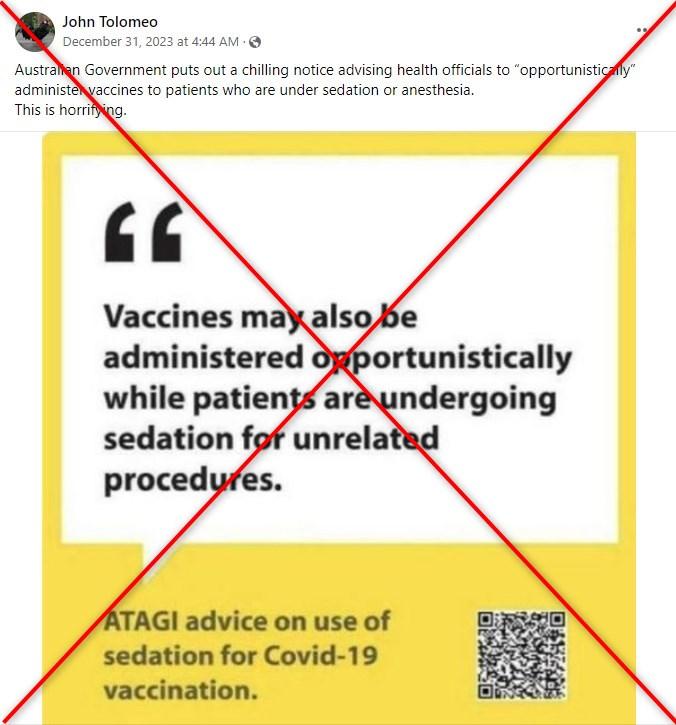
Posts misrepresent Australia govt advice on sedation to safely administer Covid jabs
- This article is more than two years old.
- Published on January 9, 2024 at 03:59
- Updated on January 17, 2024 at 02:46
- 3 min read
- By Kate TAN, AFP Australia
"Australian Government puts out a chilling notice advising health officials to 'opportunistically' administer vaccines to patients who are under sedation or anesthesia. This is horrifying," reads a post shared on Facebook on December 31, 2023.
It features a note from Australia's technical advisory group on immunisation ATAGI that reads: "ATAGI advice on use of sedation for Covid-19 vaccination."
"Vaccines may also be administered opportunistically while patients are undergoing sedation for unrelated procedures," the screenshot further says.

A similar claim has also been shared over 7,000 times in Australia, New Zealand and the United States on Facebook, as well as on the social media platform X.
Comments to these posts suggest some social media thought ATAGI's advice meant the government was forcing vaccines on sedated patients.
"What happened to informed consent?" one wrote.
"Oh no im worried I just had a procedure a month ago," another said.
The posts, however, have misrepresented ATAGI's advice.
Informed consent
A keyword search on Google found the ATAGI note corresponds to a line in a longer document published on the health ministry's website on April 6, 2022 (archived link).
The document gives an overview on the use of sedation "as one of a range of measures to assist in the safe administration" of Covid-19 vaccines.
A part that had been omitted in the misleading posts says sedation could be used in cases involving patients "with severe anxiety or needle-phobia and developmental or behavioural disorders, where non-pharmacological measures to facilitate vaccination have been exhausted."
"In most cases, sedation should not be used as a first line option. Many individuals with anxiety or behavioural disorders can be safely vaccinated in the community using non-pharmacological techniques," it adds.
These techniques include the presence of a comfort person or object, distraction with music, video or toys, and other relaxation measures.
The document states: "Informed consent must be obtained prior to each dose from the patient themselves, or, where the patient does not have capacity to give consent, from the parent, guardian or substitute decision-maker.
"Sedation should not be used as a measure to enforce compliance with vaccination requirements."
Informed consent means "a person's decision, given voluntarily, to agree to a healthcare treatment, procedure or other intervention", according to the Australian Commission on Safety and Quality in Health Care, a national health care standards agency (archived link).
'Tiny number of people'
Megan Prictor, a senior lecturer in health law at the University of Melbourne, told AFP the posts have taken ATAGI's advice "entirely out of context".
She said the document applies to "a very tiny number of people in a very unusual situation" (archived link).
The particular line misleadingly shared online is for patients who are already being sedated for another procedute, Prictor explained.
"But they want to have the vaccine. It makes more sense to vaccinate them when they're already being sedated for some other reason, rather than sedating them twice," she said.
"Informed consent for vaccination is absolutely required in every situation. Doctors can't just go around jabbing people, that's against the law."
University of Melbourne paediatrics associate professor Daryl Cheng separately told AFP: "Signed written consent is obtained prior to sedation -- as per standard protocol for any procedure completed under sedation or anaesthetic."
Both Prictor and Cheng said the posts have misunderstood the use of the word "opportunistically" in the ATAGI advice.
"The word opportunistically just refers if the patient has already given consent to have the vaccine under sedation and the person's having sedation for some other reason, then the doctor might take that opportunity to deliver that vaccination," Prictor said.
"Opportunistic doesn't mean without consent, nor does it mean a secret, coerced, forced or without the patient's knowledge," Cheng said.
AFP has repeatedly debunked misinformation around Covid-19 vaccines here.
This story was updated to correct the title and academic specialism for senior lecturer Megan Prictor.January 17, 2024 This story was updated to correct the title and academic specialism for senior lecturer Megan Prictor.
Copyright © AFP 2017-2026. Any commercial use of this content requires a subscription. Click here to find out more.
Is there content that you would like AFP to fact-check? Get in touch.
Contact us
